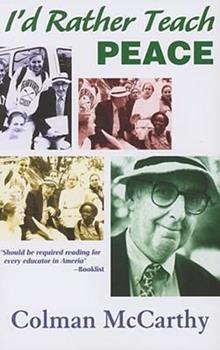Colman McCarthy -
 Having begun my thirtieth year of teaching high school, college and law school courses on the philosophy of pacifism and the methods of nonviolent conflict resolution, I was challenged again to decide where to begin this year’s course. Should I use the tenth anniversary of the 9/11 attacks to discuss nonviolent alternatives to the Bush/Cheney bents for bombs and bullets? Or pose this: would members of Congress, left or right, have voted to increase military spending so dramatically during the Bush years if they had studied peace and nonviolence in college? Would Barbara Lee of California’s 9th District have been the only member of Congress—one out of 535—to vote against the Bush war plans on September 14, 2001?
Having begun my thirtieth year of teaching high school, college and law school courses on the philosophy of pacifism and the methods of nonviolent conflict resolution, I was challenged again to decide where to begin this year’s course. Should I use the tenth anniversary of the 9/11 attacks to discuss nonviolent alternatives to the Bush/Cheney bents for bombs and bullets? Or pose this: would members of Congress, left or right, have voted to increase military spending so dramatically during the Bush years if they had studied peace and nonviolence in college? Would Barbara Lee of California’s 9th District have been the only member of Congress—one out of 535—to vote against the Bush war plans on September 14, 2001?
Should I discuss the influence of nonviolence on the protests of the Arab Spring, from Egypt to Bahrain? Or explore alternatives to more than a dozen forms of violence that put one or another group of victims at risk every day: military violence, economic violence, environmental violence, corporate violence, racial violence, homophobic violence, verbal violence, emotional violence, sexual violence, structural violence, street violence, religious violence, legal or illegal violence, video game violence, violence toward animals? Or how about a quiz? Identify: (a) Emily Greene Balch; (b) Jeannette Rankin; (c) Dorothy Day.*
I began teaching courses in what is generically known as “peace studies” out of curiosity. Are the ways of peacemaking teachable? And if so, why are so few schools—at any level—offering courses? For answers, I went in 1982 to School Without Walls, a public high school near my office at the Washington Post, to ask the principal if I could volunteer to teach a course on alternatives to violence. Give it a try, she said. The 2.5-hour weekly seminar became a discussion-based class, unmired in tests, exams or homework: neither Socrates nor Maria Montessori, my North Stars on how to navigate the seas of pedagogy, believed in such fake academic rigor. Two of my own children had been students at Walls, and they brought home stories about the school’s preference for experiential learning with internships, not theoretical learning from books.
The first courses went well. Teaching peace—reading, debating and discussing the literature and getting students to examine their choices regarding violence and nonviolence—was as easy as breathing. Some children came from violent neighborhoods and were hungry to explore the unknown landscape of nonviolence. Others were from moneyed families who had ample funds for private schools but not a taste for the insularity.
We adopted a motto for the course: Instead of asking questions, be bolder and question the answers. What answers? Those that say violence. Those that say that if we kill enough people, drop enough bombs, jail enough dissenters, torture enough prisoners, keep fighting fire with fire and not with water, we’ll have peace forever.
Enjoying it immensely, I accepted invitations from more schools: a daily 7:25 am class at Bethesda-Chevy Chase High School in suburban Maryland and a daily 9:30 am class at Wilson High in DC. By the mid-1980s I had courses at Georgetown University Law Center, American University, the University of Maryland and the Washington Center for Internships. Since 1982 I’ve had more than 8,000 students. In recent years, it’s been eight classes at six schools.
Nationally, the peace education movement is growing—some say surging—because of the continued failure of military solutions in Iraq and Afghanistan, and the belief that alternatives to violence do exist. In 1970 only Manchester College, a Church of the Brethren school in Indiana, offered a degree in peace studies. The Peace and Justice Studies Association, based at Arizona’s Prescott College, estimates that more than 500 undergraduate, master’s and doctoral programs are now being offered on US campuses. The schools include American University, Manhattan College, Hobart, Guilford, Tufts, Wellesley, Earlham, Goucher, Colgate, Goshen, Berkeley and the University of Colorado. Costa Rica has the University of Peace. The Rotary Foundation funds up to seventy master’s degree fellowships in peace studies annually. Before her death in 2003, McDonald’s heiress Joan Kroc gave generous financial support to the University of San Diego and the University of Notre Dame to create peace studies degree programs. I’ve visited both in recent months. They are thriving.
Although the message is getting out that unless we teach our children peace someone else may teach them violence, no one should be deluded. The day is distant when peace education enjoys the same academic regard as math and science. Most seniors in my high school classes have had twelve years, since first grade, of those subjects, with only one peace course—mine—tucked in as an elective. Would we ever graduate them with only one math or one science course in twelve years? Yet the young are instructed by assorted politicians, shamans and visionaries that nothing is more important than peace. Yes, children, let’s give peace a chance—but not a place in the curriculum.
Whether in high school, college or law school classes, my students usually divide into two groups. One bonds intellectually, and often quickly, with Gandhi’s belief that “nonviolence is the weapon of the strong” and agrees with Hannah Arendt that “violence, like all action, changes the world, but the most probable change is to a more violent world.” Many have endured violence in their own lives. On leaving class a few semesters ago, after we had discussed Gandhi’s views on ending war, a student pulled me aside to describe the war zone of her home—the years of witnessing her father and mother flay each other verbally, emotionally and sometimes physically. How do I end that war? she asked.
Valid question. Perhaps if we’d had her parents in schools where nonviolent conflict-resolution skills were systematically taught, battles on the home front might have been resolved before the marriage was wrecked. It was too late for this couple, who had left school as peace illiterates. Shaping a peaceful child is easier than reshaping a violent adult. Is it grandiose to think that if peace courses were in the nation’s schools, domestic violence—the leading cause of injury to women—would decrease?
The other group comes to class encrusted with doubts, eyeing me as a 1960s lefty who had stuck one too many daisies into soldiers’ gun barrels and knocked on one too many doors in New Hampshire for Gene McCarthy in ’68. Nonviolence and pacifism are noble theories, they instruct me, but in the real world we have to deal with, and destroy, despots across the ocean and street thugs across town. So let’s keep our bomb bays opened and our fists cocked. I respect the students’ skepticism, while asking them to consider that if violence were truly effective, we would have had peace eons ago. And to remember that in the past quarter-century at least seven brutal regimes—in the Philippines, Chile, Poland, Yugoslavia, Georgia, Egypt and Tunisia—were overthrown by people who relied on weapons of the spirit more than on weapons of steel. To varying degrees, their strategies of nonviolence worked. During the same years, American presidents and Congresses ordered up violent force in Libya, Grenada, Panama, Haiti, Somalia, Sudan, Yemen, Pakistan, Afghanistan and Iraq. For what? Mounds of corpses, profits to weapons companies, career boosts for generals, high rates of suicide among veterans and soldiers, and an economy laid waste by spending on wars that can’t be won, afforded or explained.
* * *
Peace teachers have no illusions that exposing students to the literature of peace and the methods of nonviolence will cause governments to stockpile plowshares rather than swords, or that across the Hudson River from the West Point Military Academy will be the East Point Peace Academy. Nor do they see the fog clearing when it comes to persuading the academic mahatmas on school boards that the study of peace should be given as primary a place in the curriculum as any other essential subject. In elementary and secondary schools this is the era of No Child Left Untested—our answer to the latest report that all those Chinese and Korean grade-school smarties are way ahead of America’s layabouts.
Just muscling one course into one school takes extraordinary flexing. A while back I was invited by a school board to speak on peace education. After twenty minutes I thought I was getting through. My goal was to move the board members to permit one peace class in each of the county’s twenty-two high schools. One course. One period a day. An elective for seniors. Nothing grand.
I was already a volunteer peace teacher in one of the county’s high schools, so I wasn’t breezing in as a theorist with a lofty idea. At the end of my pitch, a board member had a problem. “Peace studies,” he pondered. Is there another phrase? The word “studies” was OK, but “peace”? It might raise concerns in the community. I envisioned a newspaper headline: “Peace Studies Proposal Threatens Stability in the County.” The same school board gives military recruiters full access to the county’s high schools.
Unable to rally the board, I tried the school system’s curriculum office. It was an end run, and there’s always an end to run around if you look hard enough. I had edited a textbook, Solutions to Violence, a sixteen-chapter collection of ninety essays published by my Center for Teaching Peace that ranged from Gene Sharp’s “The Technique of Nonviolent Action” to Joan Baez’s “What Would You Do If?” After near-endless meetings with assorted bureaucrats, papercrats and educrats, I realized that public schools are government schools. Teachers are government workers. Obedience prevails. Innovation is suspect. It took six years to get Solutions to Violence approved. I’d already been using it in my course during that time, slipping it in like contraband and starting off the semester with a discussion of Thoreau’s “On the Duty of Civil Disobedience.” Might as well practice it. I’ve edited another one, this for my college and law school classes: Strength Through Peace: The Ideas and People of Nonviolence.
Private schools, moated to keep the hordes from storming in, have their own ways of caution about peace education. Excessive amounts of Advanced Placement courses, matched by equally excessive amounts of homework, are the air currents expected to waft students into top colleges. How can a mere peace course oxygenate an already rarefied air? Neither theoretical nor experiential knowledge of nonviolence is seen as a help in acing the SATs. Kaplan prep courses are about outfoxing tests, not developing reflectiveness. Doubtless, private schools produce brainy students. But are they brainy and peace-educated? I recall speaking at a New England prep school and being told by the headmaster that he takes peace education seriously: once a year Peace Day is observed. I wondered: Is there an annual Algebra Day? A yearly Physics Day?
I’ve taught in several private high schools in the Washington area, including Georgetown Day School, Landon and Stone Ridge. The course attracted students who had unshackled themselves from the academic pressures by realizing that Walker Percy had it right: you can make all A’s in school and go on to flunk life. They grasped that, often enough, private schools, however committed to excellence the faculties may be, process students as if they are hunks of cheese enrolled in Velveeta Prep on the way to Mozzarella U and Parmesan grad school.
A crucial part of peace education is exposing students to the personal joys of service, giving them a chance to become, in Martin Luther King Jr.’s words, “other-centered,” not “self-centered.” I’ve taken my high school, college and law school students into prisons, death-row cellblocks, literacy centers and soup kitchens—sometimes to be of real service, other times merely to be around and learn from people who are broke but not broken.
Serving food to the hungry or tutoring inmates is useful, but it can remain mere dabbling in charity if we don’t return to the classroom to examine the connections between injustice and public policy. Which political decisions permit massive increases in military and security spending and projected decreases for the Peace Corps and AmeriCorps? Which policies are allowing prisons to be packed with the mentally ill and drug-addicted, who need treatment, not punishment? Which fiscal policies create tax shelters for the rich rather than homeless shelters for the poor?
I’ve been accused of teaching a one-sided course. Perhaps, except that my course is the other side, the one that students aren’t getting in conventional history or political science courses, which present violent, militaristic solutions as rational and necessary.
* * *
In 1985 my wife and I founded the Center for Teaching Peace. Supported by foundation grants and membership, our work is assisting schools at all levels either to begin or expand academic programs in peace education. I’ve seen progress, such as that described by Paul Wack, a teacher at Niles West High School in Skokie, Illinois, in a letter four years ago: “I’m writing to let you know that our district, somewhat miraculously, approved a peace studies course…. I ordered your two collections of peace essays years ago, and you wrote back an encouraging letter. It takes a long time to get a course started here, with many institutional hoops to go through. Two other teachers and I put a proposal together, which at first was rejected. It was too ‘social studies’ oriented. We are all, incidentally, English teachers. Our second proposal, titled ‘The Literature of Peace,’ was accepted by the school board. This was the miraculous part.”
Recently, Wack reported that his efforts remain on sure footing: “Students often tell me that ‘Literature of Peace and Nonviolence’ is the one course where we talk about things that matter.” A nearby school now has a similar course.
Over the years, I’ve visited hundreds of schools to lecture on the need for peace education. I can report that large numbers of students, whether seeking alternatives to violence in their lives or sickened by governments that rely on the gun, have embraced the advice offered to the young a century ago by Prince Peter Kropotkin: “Think about the kind of world you want to live and work in. What do you need to know to build that world? Demand that your teachers teach you that.”
Is there any doubt that a peaceful world is what the young want and that so far violent solutions have abjectly failed?
Source: http://www.thenation.com/article/163053/teaching-peace
The Center for Teaching Peace has produced two text books, Solutions to Violence and Strength Through Peace, both edited by Colman McCarthy. Each book contains 90 essays by the world's great theorists and practitioners of non-violence. ($25 each). To contact Colman McCarthy, write to: Center for Teaching Peace, 4501 Van Ness Street, N.W., Washington, D.C. 20016 Phone: (202) 537-1372
Links:
- Colman McCarthy Is Teaching Peace In America’s Schools - KPBS, SDSU
- Respond to Violence: Teach Peace, Not War - Common Dreams
- Friends program promotes paths to peaceful resolution - Frederick News Post
Curriculum:
-
The Class of Nonviolence - Colman McCarthy
Please consider becoming a $10 per month supporter of The National Network Opposing the Militarization of Youth
And our work to demilitarize our schools and youth.
Donate Here\
###


 No mail on Saturday, maybe, but small-town police get armored personnel carriers?
No mail on Saturday, maybe, but small-town police get armored personnel carriers? SINCE ITS ADOPTION IN 1989, the United Nations Convention on the Rights of the Child has been ratified more quickly and by more governments than any other human rights instrument.1 There are only two United Nations (UN) members who have yet to ratify the convention: Somalia and the United States. Opponents of ratification object to giving away US sovereignty to the UN (a general objection applying to most treaties), but they also claim the treaty undermines parental rights.2
SINCE ITS ADOPTION IN 1989, the United Nations Convention on the Rights of the Child has been ratified more quickly and by more governments than any other human rights instrument.1 There are only two United Nations (UN) members who have yet to ratify the convention: Somalia and the United States. Opponents of ratification object to giving away US sovereignty to the UN (a general objection applying to most treaties), but they also claim the treaty undermines parental rights.2




